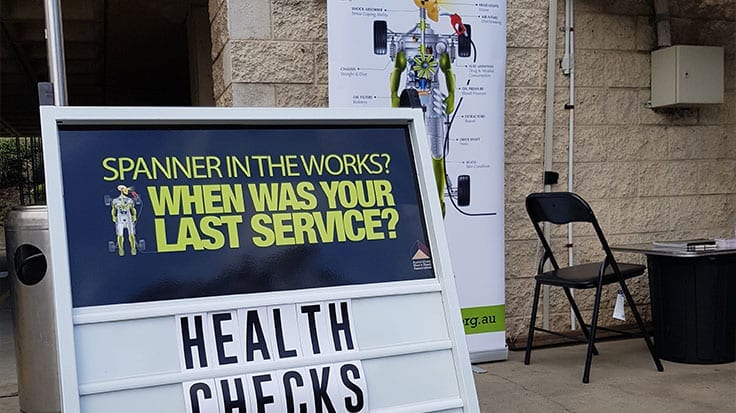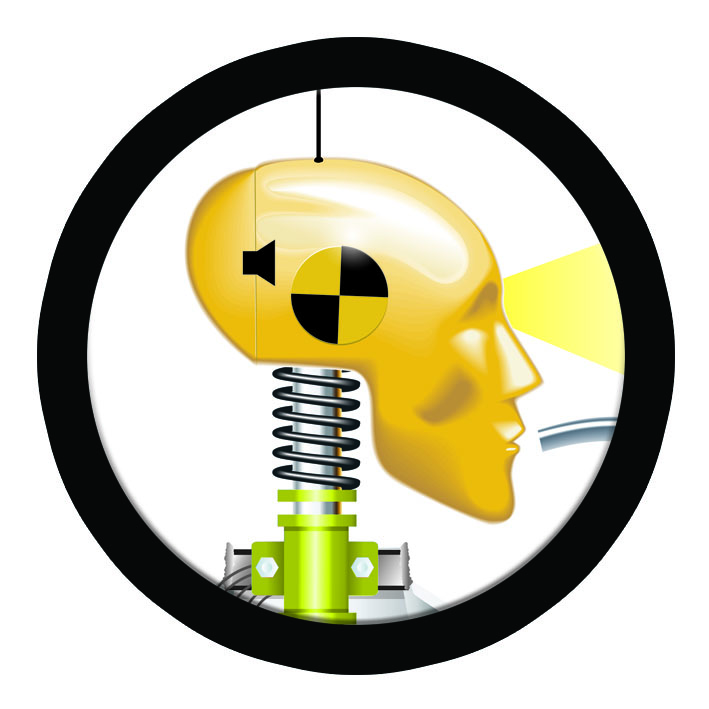
Memory changes can be subtle. You may not be aware of them. If you, or those around you, notice:
- Memory loss that affects day-to-day function
- Have difficulty performing familiar tasks
- Seem to get confused about time and place
- Forget simple words and find it harder to communicate
- Start finding it difficult to judge distance or direction
- Keep placing things like your keys in strange places
If you are concerned about your memory, chat to your GP who can assess the whole picture. There are many things, such as not getting enough sleep that can cause memory issues. Get a check to work it out!

Getting your vision tested is an important part of your eye health.
Optometrists and other eye health professionals can help you identify any changes or problems with your vision and ensure you’re getting the support you need. General eye tests can be bulk-billed, so book a check today.

If you haven’t been following your general maintenance hearing
checks, now is a good time to start. Some signs that you may need to
have your hearing checked include:
- Ringing sensation in the ears (tinnitus)
- People complain that you talk too loudly
- You often need to ask people to repeat what they say
- You find it hard to hear conversations, especially if there’s
background noise - Others complain that you watch television with the volume turned too high.
![]()
Your stroke risk is higher if:
- You have high blood pressure or cholesterol
- You smoke
- You’re overweight
- You don’t eat well
- You don’t exercise and over indulge in alcohol
- You have diabetes or other heart conditions
- You have a family history of stroke.
You may want to talk with your GP about ways you can reduce your risk of having a stroke.
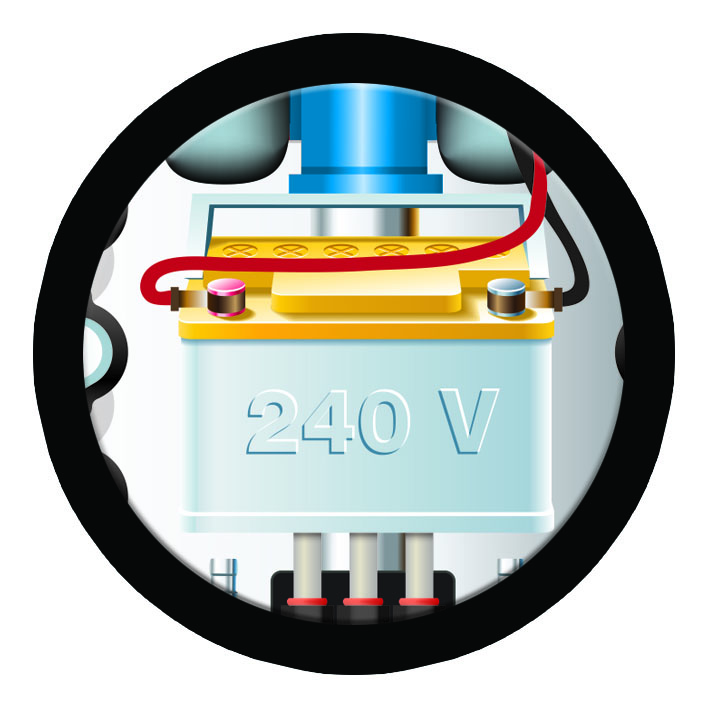
DIY Maintenance
All of us have good days and bad days. Are you:
- Feeling down or sad often?
- Feeling worries or nervous?
- Often feeling tired?
- Avoiding people and/or places?
Service Schedule (Health Professional/GP)
If you answered yes to any of these questions, have a chat with your GP about some of the things you can do to manage your mental health. Not everything needs a tablet or medicine, and your GP can work with you to learn what will work best for you.

DIY Maintenance
Look after those teeth and gums. Make sure you are brushing and flossing regularly. If your gums are red and sore often, or you have tooth pain, get to the dentist for some help.
Service Schedule (Health Professional/GP)
See the dentist each year for a scheduled service and maintenance.
![]()
Service Schedule (Health Professional/GP)
Gambling can become a problem if you don’t keep it in check. Are you:
- Chasing bets to get money back?
- Concerned about your finances as a result of gambling?
- Hiding your gambling from others?
- Gambling alone?
If you answered yes to any of these questions, or your gambling is worrying you, chat to your GP or find your local Gambler’s Help service.
![]()
DIY Maintenance
Aim for two alcohol-free days per week, and two standard drinks only for each day you decide to have a drink. If your alcohol consumption is high, look at taking a break, or reducing consumption. You may also want to consider the type of alcohol drink you are having: is it a standard serve or higher? Does it have high sugar content?
Service Schedule (Health Professional/GP)
Chat to your doctor if you think your alcohol consumption is too high and you need help to reduce it. They’ll be able to refer you to a drug and alcohol service for support or talk about the options you can try yourself.
Talk with a dietitian about some options if you’re not sure about the best drinks/food for you.
![]()
DIY Maintenance
Are you:
+ missing time from study, work or social events because of your
drug use?
+ using drugs to make yourself feel better or stronger?
+ feeling that you need drugs to function normally?
+ wanting to stop using drugs but can’t?
+ taking risks that might harm you or others when using drugs?
Service Schedule (Health Professional/GP)
If you answered ‘yes’ to any of these questions, you should seek
professional help. Chat to your GP about the ways your drug use is
affecting your life. Ask if there’s a local service that can support you in reducing or stopping your drug use.
![]()
DIY Maintenance
Make sure you know the regular prescribed medications, complementary therapies and/or supplements you take. Sometimes
they can interact in ways that aren’t good for you.
Service Schedule (Health Professional/GP)
Chat to your GP or pharmacist about a medication review. It’s an easy way to be sure that your meds work together and meet your needs.

Having blocked fuel filters can be associated with many other health
conditions. You are at greater risk of developing kidney disease if:
- You have diabetes
- You have high blood pressure
- You have heart problems, or you’ve have had a stroke
- You have a family history of kidney failure
- You’re obese
- You smoke
- You’ve had an acute kidney injury.
Ask your GP to do a kidney health check to help detect disease early,
and improve outcomes.
![]()
There are many things that can contribute to gut troubles. If you notice bloating, diarrhoea, gas, stomach pain or cramps that linger on, it’s a good idea to get some advice.
Check with your GP if you have a ‘gut feeling’ that things aren’t right. Your GP can work with you to find out what’s troubling you or refer you to more specialised support.
![]()
DIY Maintenance
Have you noticed:
+ you have a persistent or changed cough
+ you cough up mucus, phlegm or blood
+ you find yourself out of breath easily
+ your chest is tight or you’re wheezing
+ you’re getting chest infections more often
+ you have chest pain or fatigue
+ you’ve had sudden weight loss
+ you’ve been exposed to dust, gas or fumes at your job?
Service Schedule (Health Professional/GP)
If you answered ‘yes’ to any of these questions, make an appointment with your GP to discuss your lung health. You may want to complete the Lung Foundation Australia’s online
checklist to take to your GP.
![]()
DIY Maintenance
Your body is better without the smokes. Quitting can be hard but it’s worth the investment. Try to reduce the number of cigarettes you have each day if you can.
Service Schedule (Health Professional/GP)
If you’re ready to quit for good, chat to your GP about the support available to help you give up the gaspers.
![]()
DIY Maintenance
Heart disease is the single biggest killer of Australians. But, for the most part, it can be prevented. Know your risk factors and get a heart health check if you are over 45. You could also try the Heart Age Calculator on the Heart Foundation website.
Service Schedule (Health Professional/GP)
If you are over 45, visit your GP for a heart health check. It’s also good to get your GP to check your blood pressure and cholesterol when you visit.
![]()
DIY Maintenance
Diabetes is one of the biggest challenges confronting the health of Australians. The impact of poorly managed diabetes on your health and wellbeing can be severe. Diabetes can have an impact on your eyes, limbs, heart, reproductive health and mental health. There are two types of diabetes that affect men. Type 1 diabetes is an auto-immune condition. Type 2 diabetes can be prevented or
delayed by adopting these strategies:
+ maintaining a healthy weight
+ exercising regularly
+ making healthy food choices
+ managing blood pressure
+ managing cholesterol levels
+ quitting smoking.
Service Schedule (Health Professional/GP)
If you are over the age of 40, ask your GP to screen you for diabetes every three years.
![]()
DIY Maintenance
Check the UV index to assess sun strength. If you’re out in the sun and the UV index is over 3, slip on a shirt, slop on the sunscreen and slap on a hat.
+ Check your skin after a shower for any new markings, freckles or
moles.
Service Schedule (Health Professional/GP)
If you notice any new skin markings, or your existing markings are changing, head straight to your GP for a skin check.
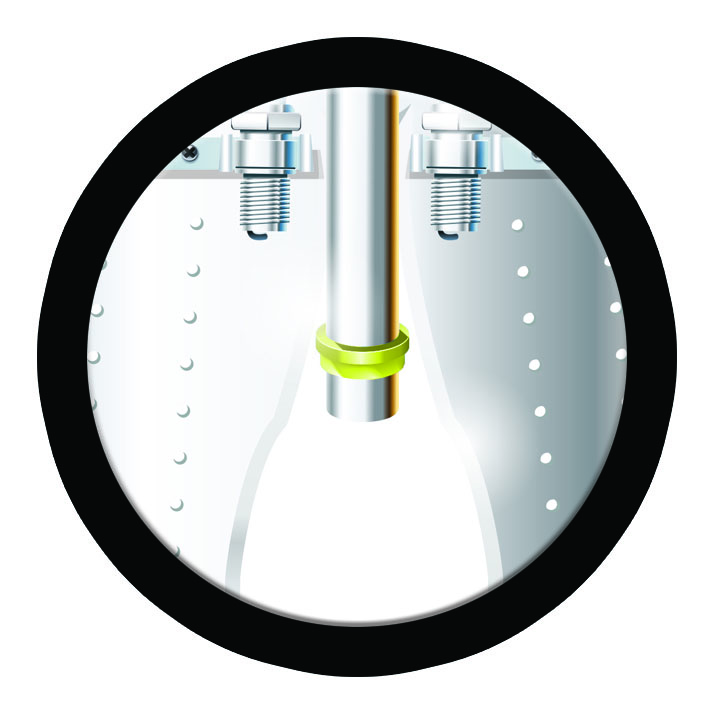
Your fuel pump (prostate) gets bigger as you get older. This is normal. Sometimes things can go wrong with your fuel pump. Common prostate problems include benign prostatic hyperplasia (BPH), prostatitis and prostate cancer. If you notice pelvic and/or lower back pain, painful and/or frequent urination, fever, chills and a lack of energy – go and see your doctor as early as possible to get some tests and a plan of action.
![]()
If you experience after-dribble (small amount of urine loss after
emptying your bladder) alongside any of the following symptoms it is important that you seek professional help:
- Difficulty initiating the flow of urine
- Having to strain to empty your bladder
- A slow urine stream when emptying your bladder
- Feeling the need to urgently empty your bladder
- Burning, discomfort or pain when emptying your bladder
- Blood-stained urine
- Having to get up several times overnight to empty your bladder
- Having to change your lifestyle because of problems with your bladder or bowel.

DIY Maintenance
Talking about reproductive and sexual health can be a bit sensitive. Rest assured that the challenges you might face are far more common than you think. You can visit the Healthy Male website for more information.
Have you noticed that you:
+ can’t get, or keep, an erection
+ have low sex drive
+ have unusual lumps on your testes (check them when you’re in the shower)?
Service Schedule (Health Professional/GP)
If you answered ‘yes’ to any of the above, talk to your GP to address the problem early. Ask your GP to arrange a sexual health
check or visit a sexual health clinic if you have had unprotected sex.
![]()
DIY Maintenance
Constipation can be quite uncomfortable. It can also impact other parts of your body, including the prostate. Lifestyle changes, such as a high fibre diet can help relieve a blocked extractor.
Service Schedule (Health Professional/GP)
If your bowels are constantly blocked and giving you trouble, talk to your GP about a plan to keep the extractor flowing.
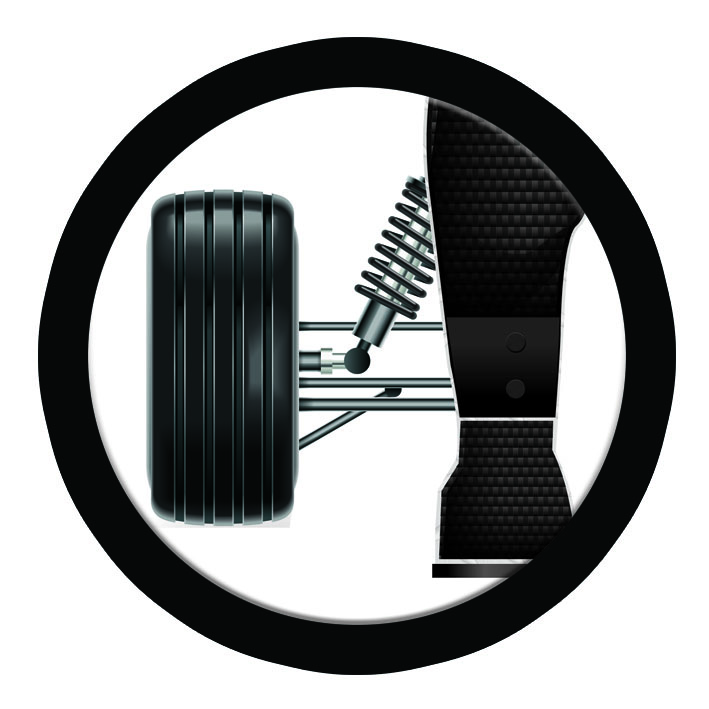
If you notice persistent, niggling pain in your joints that doesn’t seem to go fully go away, chat with your GP about what you can do to improve your joint health as you get older. There are lots of great ways to manage the joints if you start early.

Osteoporosis is a silent disease. You often don’t know it is a problem
until you break a bone. Almost a quarter of all people with osteoporosis are men. When you have osteoporosis your bones can break from just a minor bump or fall. Taking early action is the most effective way of preventing a broken bone. If you have low testosterone, or have broken a bone from a minor fall, make sure you talk about bone density testing with your GP.
![]()
Talk to your GP if you have persistent problems with your sleep, if it’s affecting your daytime wellbeing, or if you’re always feeling sleepy during the day. This isn’t a normal part of getting older. You should also seek help if your partner notices something wrong with your breathing during sleep. There are effective treatments for snoring, sleep apnoea and insomnia.
![]()
Speak to your GP at your next visit to see whether it is worth having a tetanus booster or flu / pneumonia shots.
![]()
DIY Maintenance
Food is fuel for your body. Treats are okay in moderation but try to eat as much high- octane fuel, like fruits and vegetables, as often as possible. Choose foods that are good for you and that help reduce the risk of developing chronic health problems.
Service Schedule (Health Professional/GP)
Seek support from a dietitian or your GP if you’re not sure what fuel is right for you, or if you have specific needs to maintain your wellbeing.
![]()
DIY Maintenance
A machine needs to run regularly to stay lubricated. In the same way, your body needs to move regularly to keep functioning well. Be active on most days, but preferably every day if you can. Aim to do at least two and a half hours of physical activity over a week (include muscle strengthening activities at least twice).
Service Schedule (Health Professional/GP)
Not sure what’s right for you? An exercise professional can help
you find the right approach for your specific needs.
![]()
DIY Maintenance
Relationships with loved ones, family and friends are important for your wellbeing. Sometimes we need some help to get or keep them on track. Many people in a relationship need assistance at some time to:
+ deal with problems or difficulties in their relationship
+ improve communication
+ cope with a relationship that’s broken down
+ change a relationship where there is violence and abuse
People who communicate effectively are more likely to handle conflict and deal with their issues in healthy ways.
Service Schedule (Health Professional/GP)
If you’re having relationship difficulties, support is available to
help you work through any issues and develop better ways to cope with them. Chat to your GP about support services available or contact Relationships Australia.
